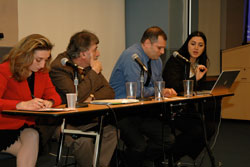- About Ramapo
- Academics
- Admissions & Aid
- Student Life
- Athletics
- Alumni
- Arts & Community
- Quick Links
- Apply
- Visit
- Give
Panel At Ramapo College on Apology, Justice and Reparations in Confronting the Armenian Genocide
(PDF) (DOC) (JPG)November 11, 2010
 (MAHWAH, NJ) – A panel discussion took place at Ramapo College of New Jersey on November 11 under the auspices of the Center for Holocaust and Genocide Studies and the Armenian National Committee of New Jersey to consider issues related to apology, justice, and reparations with regard to the Armenian Genocide.
(MAHWAH, NJ) – A panel discussion took place at Ramapo College of New Jersey on November 11 under the auspices of the Center for Holocaust and Genocide Studies and the Armenian National Committee of New Jersey to consider issues related to apology, justice, and reparations with regard to the Armenian Genocide.
Titled “From Democracy to Justice: Turks, Kurds, and Armenians in the 21st Century,” the panel assessed recent efforts by Armenian, Turkish, and other scholars to make the Armenian Genocide an issue of justice.
More and more Turkish journalists and scholars have come to view the recognition of the deportation and massacres of Armenians as an important step towards the democratization of Turkey and a litmus test of their country’s freedom of speech. On the other hand, for the victims and descendants of the Genocide, the concept of democracy factors less importantly than Turkey finally admitting to the Genocide and making amends through reparations.
The four speakers who comprised the panel have all spoken in Turkey about issues related to apology, justice, and reparations:
Bilgin Ayata is completing her Ph.D. at the department of political science at Johns Hopkins University, Baltimore. Her research interests include the politics of displace- ment, trans-nationalism, social movements, and migration. Her dissertation examines the displacement of Kurds in Turkey and Europe. She currently lives in Berlin, from where she participated on the panel via Skype.
Ayda Erbal is writing her dissertation in the department of politics at New York University. She teaches two advanced undergraduate classes, “International Politics of the Middle East” and “Democracy and Dictatorship,” as adjunct professor of politics. Her work focuses on the politics of changing historiographies in Turkey and Israel. She is interested in democratic theory, democratic deliberation, the politics of “post-nationalist” historiographies in transitional settings, and the politics of apology.
Levin Marashlian is a professor of History at Glendale Community College in California, teaching Armenian history and Diaspora current affairs, as well as Middle Eastern, Russian, and U.S. history and politics. He has also taught courses at the University of California Los Angeles (UCLA), California State University Northridge (CSUN), and Los Angeles Valley Community College.
He was invited to Ankara in 1990 to participate in the government-sponsored 11th Congress of Turkish History; paper, “Economic and Moral Influences on US Policies Toward Turkey and the Armenians, 1919-1923,” covered the Armenian Genocide and its aftermath and was published in Ankara by the Turkish Historical Society Press in 1994; also published in Turkish as a book: “Ermeni Sorunu ve Turk-Amerikan Iliskileri,” 1919-1923 (Istanbul: Belge Uluslararasi Yayincilik, 2000.)
Henry C. Theriault is Chair of Philosophy Department at Worcester State College, where he has taught since 1998. Since 2007, he has served as co-editor-in-chief of Genocide Studies and Prevention. His publications include “Genocide, Denial, and Domination: Armenian-Turkish Relations From Conflict Resolution to Just Transformation,” National University of Rwanda Centre for Conflict Management Journal, (April 2009; Politics and Demography: Armenians, Turks and Kurds in the Ottoman Empire (Cambridge, 1991), “Finishing the Genocide: Cleansing Turkey of Armenian Survivors, 1920-1923,” in Richard Hovannisian, ed., Remembrance and Denial: The Case of the Armenian Genocide (Detroit, 1998).
A good deal of the discussion centered on the recent apology campaign launched by some Turkish intellectuals. Ayata and Erbal, in particular, stressed that while the intentions of the activists were laudable and headed in the right direction, the ambivalent wording of their utterances, especially the use of the term ‘Great Catastrophe’ instead of ‘genocide’ made apology sound less than genuine. To bolster her point, Erbal used a video clip from last season’s finale episode HBO Series, Curb Your Enthusiasm. It depicts Larry David failing to clear the way for the broadcast of a Seinfeld reunion show by offering an insincere apology to a network executive. She reiterated the point several times that an insincere apology in such cases is the same and maybe worse than no apology at all.
For his part, Henry Theriault maintained that reparations and justice would ultimately have to be part of the reconciliation process between Armenians and Turks. Not too different from the post-Holocaust restitution, it would compensate the Armenian community for the wealth taken, which in many cases can be traced to the basis of the wealth of Turkish families and business today. It would also include, Theriault explained, restitution for the territories “cleansed” of Armenians and “Turkified” in the wake of genocide. In addition to bolstering the future viability of the Republic of Armenia today as well as Armenian society and culture in the future, Theriault expressed the view that reparations represent the visible and meaningful means for perpetrator groups or their progeny to make amends to victim groups. In his view, apologies without compensation rang hollow.
E-News Archives
| 2023 | 2022 | 2021 | 2019 | 2018 | 2017 | 2016 | 2015 | 2014 | 2013 | 2012 | 2011 | 2010 | 2009 | 2008 | 2007 |Copyright ©2025 Ramapo College Of New Jersey. Statements And Policies. Contact Webmaster.

Follow Us!